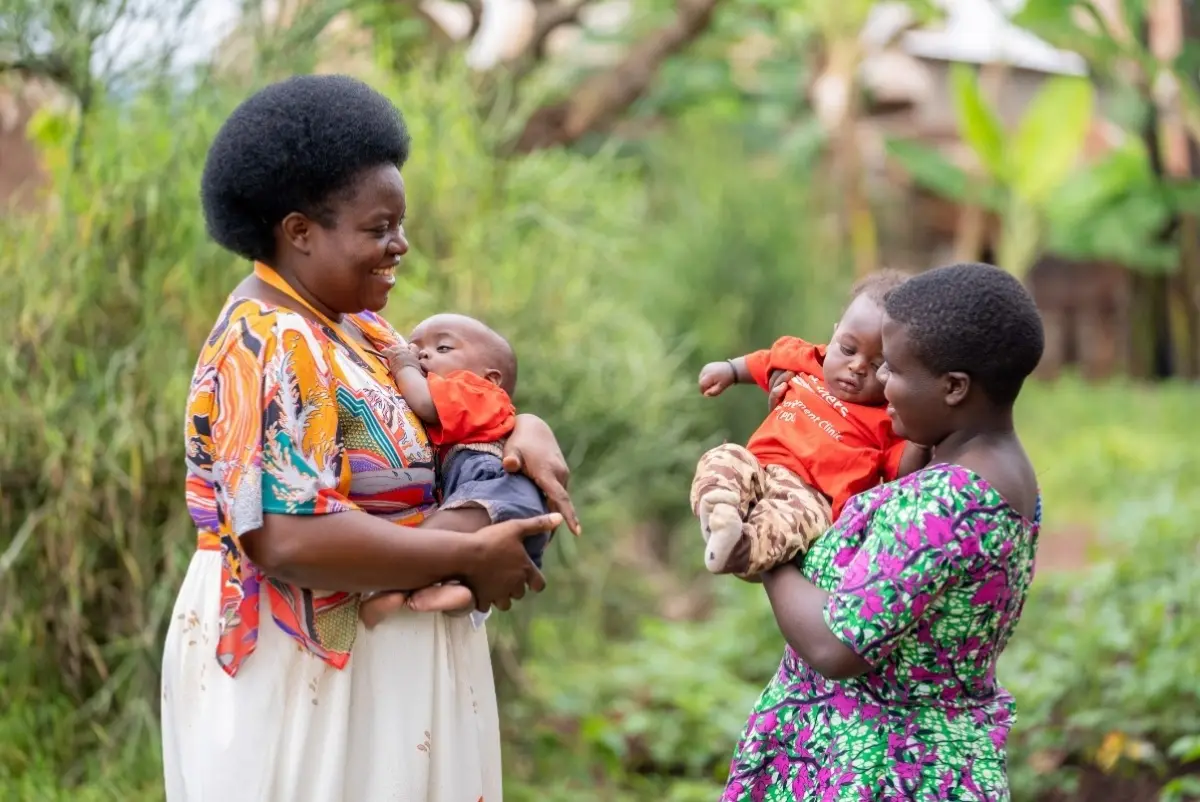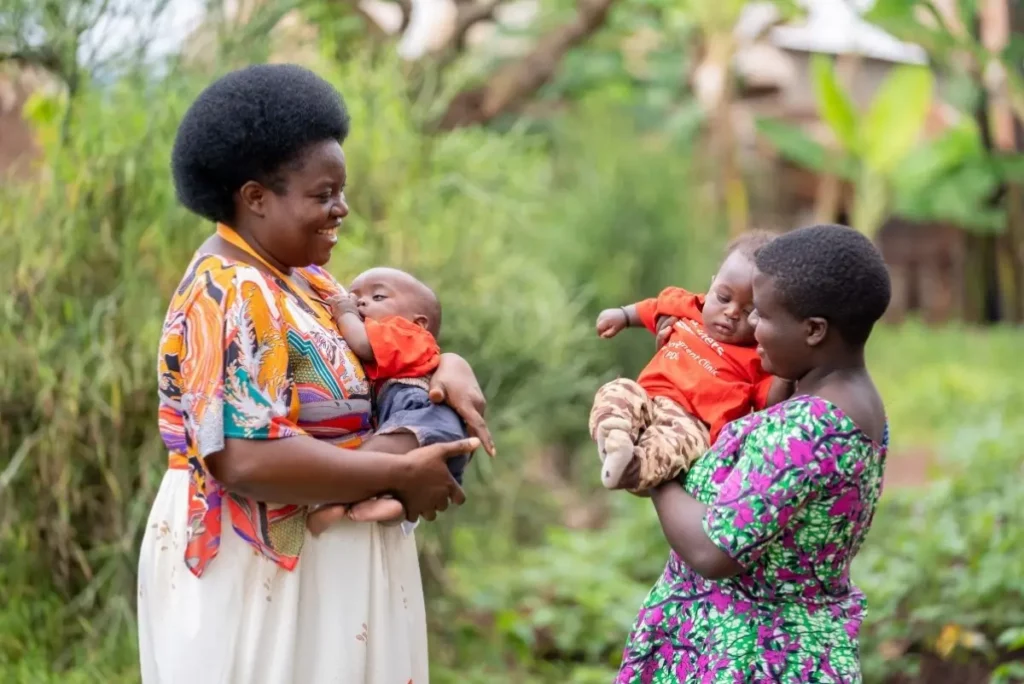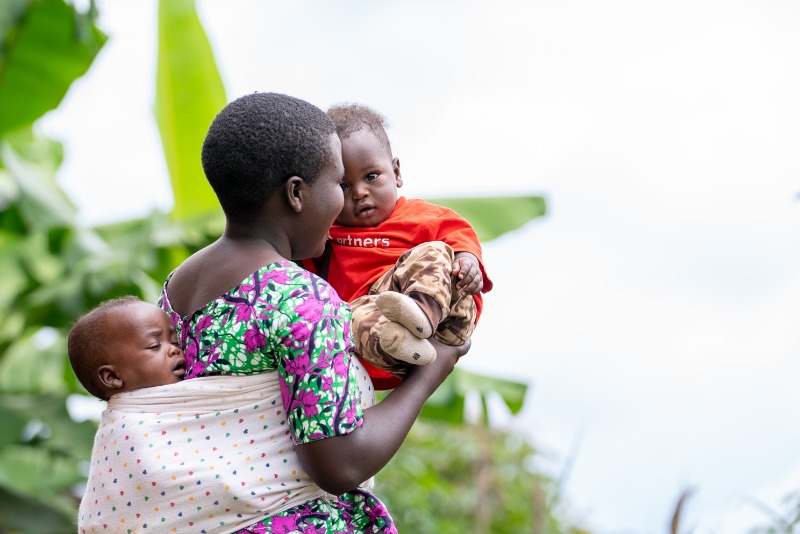Teen Mother Navigates Challenges with Expert Care in Rwanda

An unexpected pregnancy, with twins, leads young mother to a supportive health system
Posted on May 23, 2023

Playing with her 6-month-old son with one arm while supporting her second son with the other as he breastfeeds, Solange Manirumva, 20, has slowly adapted to being a mother of twins.
Just three years ago, she was a high school student.
“I would leave my children alone and just leave,” said Manirumva, reflecting on difficult, earlier days of motherhood. “But I now enjoy spending time with them.”
Being a mother at a young age, while also supporting her family, was overwhelming.
Manirumva, like many young women in rural villages, faced the responsibilities of adulthood much earlier than planned. She became her family’s primary earner in her teens. When she unexpectedly got pregnant with twins, she found Inshuti Mu Buzima (IMB), as Partners In Health is known in Rwanda, along this path.
Bearing Family Responsibilities
Manirumva’s mother died in 2016 while giving birth to her youngest brother, leaving behind four children and their 74-year-old father.
Her father was too old to work in the fields, which is the main source of income for families like Manirumva’s, living in poverty and making a living from cultivating other people’s fields for money. As a result, most of the responsibilities to raise her siblings, like paying for school materials and providing food, fell on her shoulders.
To support her family, she would stop going to school for a couple of weeks to work in the fields for daily wages. Despite this, she performed well and passed the national exam to attend a top boarding high school. A family friend volunteered to support her education, but there was a price paid for that support.
“He would pay for my school fees and other school materials,” said Manirumva. “He would also visit me and [we would] go out together.”
In 2019, during the second term of her second-to-last year of high school, she felt more emotional than usual and noticed her period was late.
“I immediately knew I was pregnant,” said Manirumva. When she shared the news with the family friend who got her pregnant, he stopped talking to her.
She told the school administration that she had a terrible headache and asked to go home for treatment. In anticipation of her baby’s arrival, she applied to be a paid youth volunteer, helping the government’s COVID-19 response. She earned enough money to open a vegetable stand in a local market and used the cash to buy clothes and bedding, saving the rest.
A Premature Birth
One late evening, two months before her due date, she started to have unusual contractions. She called a neighbor who took her to the nearest health center, and from there, she was transferred to IMB-supported Kirehe District Hospital.
“I thought I would give birth in two months,” said Manirumva. “I had visited a health center once, and they told me I had one baby and my pregnancy was fine.”
At Kirehe District Hospital, Manirumva gave birth to not one but two premature infants, weighing 1.3 and 1.1 pounds.
“I was surprised that I had twins,” said Manirumva, who was in shock at the news. “I didn’t think much of the babies, because I thought they would die. They were very tiny.”
In fact, she grappled with depression in the first days, and it took time for her to adjust to the new reality.
The babies were immediately taken to the neonatal intense care unit (NICU). NICUs are crucial resources for newborn care, providing oxygen therapy and other lifesaving services for babies born prematurely or with complications. Luckily for the young family, Inshuti Mu Buzima had recently opened a newly renovated NICU at Kirehe District Hospital, in partnership with the Rwandan Ministry of Health.
Inshuti Mu Buzima supports the Rwandan Ministry of Health to make pregnancy, labor, and birth safer for mothers and newborns by training health care providers, building infrastructure, and strengthening health systems.

Finding Expert Care
In Kirehe’s NICU, Manirumva—like all other mothers—was assisted by a team of doctors, nurses, and expert mothers who guided her through her first days there by teaching her the proper techniques for breastfeeding, how to preserve breast milk, and how to care for herself, among other essential skills.
“I loved chatting with other moms in the NICU,” said Manirumva. “The advice the nurses gave us helped me to overcome fear and get used to my babies.”
Inshuti Mu Buzima practices an integrated form of care to help both new mothers and their children. The twins, like all children born prematurely or with other complications, were enrolled in Kirehe’s Pediatric Development Clinic (PDC), an interdisciplinary program intended to improve health outcomes for babies at risk of death or developmental delays, especially in their first five years of life.
Through the Pediatric Development Clinic, Manirumva met with Cecile Itangishaka, IMB’s psychosocial and community support coordinator, who continued to follow up on the young mother of twins after she was discharged.
Homecoming was difficult for Manirumva and her boys. Many of the resources at the hospital—from baby formula and regular meals to a feeling of safety and comfort provided by other mothers and care providers—weren’t there when she got home.
“There was not enough food at home,” said Manirumva. “I was concerned about the health of my babies, but Itangishaka and IMB staff continued to visit me and brought food, clothes, and even a mattress.”
The twins, like all children enrolled in the Pediatric Development Clinic, receive regular follow up through clinic appointments and community-based support to ensure that they are thriving. Manirumva receives services that include parenting education, counseling, and social support.
“The babies are much bigger now,” said Manirumva. “The young one especially is very active.”
Originally published on pih.org



